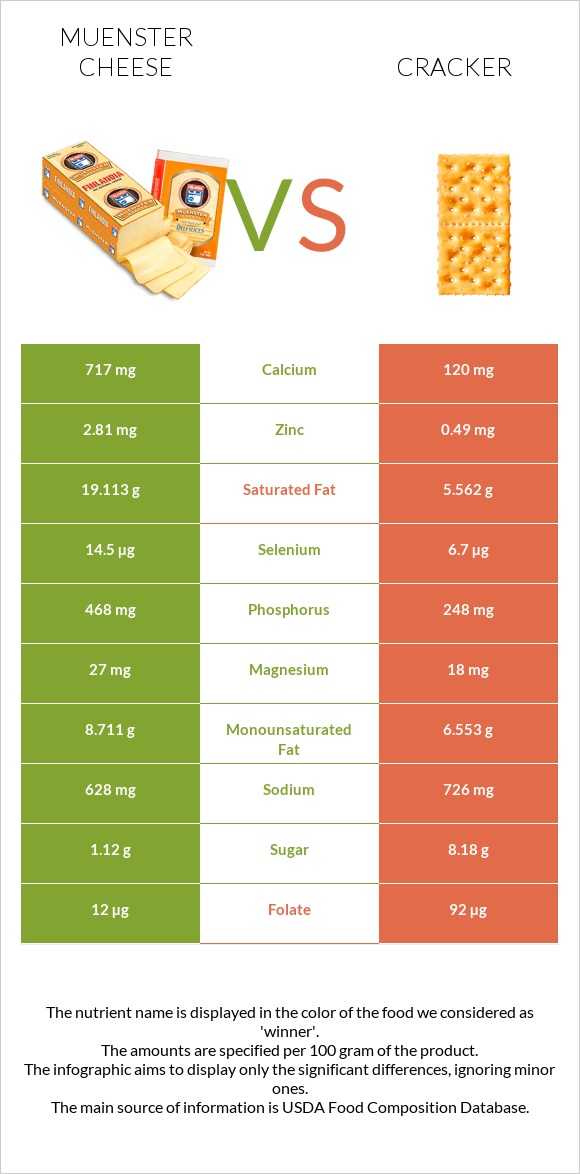Muenster cheese vs. Crackers — In-Depth Nutrition Comparison
Compare
How are muenster cheese and crackers different?
- Muenster cheese is higher in vitamin B12, calcium, phosphorus, and zinc; however, crackers are richer in vitamin K, iron, vitamin B1, and vitamin B3.
- Daily need coverage for saturated fat for muenster cheese is 68% higher.
- Crackers have less cholesterol.
- Muenster cheese has a lower glycemic index (27) than crackers (63).
Cheese, muenster and Crackers, standard snack-type, regular are the varieties used in this article.
Infographic

Infographic link
Mineral Comparison
Mineral comparison score is based on the number of minerals by which one or the other food is richer. The "coverage" charts below show how much of the daily needs can be covered by 300 grams of the food.
| Contains more MagnesiumMagnesium | +50% |
| Contains more CalciumCalcium | +497.5% |
| Contains more PotassiumPotassium | +13.6% |
| Contains more ZincZinc | +473.5% |
| Contains more PhosphorusPhosphorus | +88.7% |
| Contains less SodiumSodium | -13.5% |
| Contains more SeleniumSelenium | +116.4% |
| Contains more IronIron | +882.9% |
| Contains more CopperCopper | +235.5% |
| Contains more ManganeseManganese | +6037.5% |
Vitamin Comparison
Vitamin comparison score is based on the number of vitamins by which one or the other food is richer. The "coverage" charts below show how much of the daily needs can be covered by 300 grams of the food.
| Contains more Vitamin AVitamin A | +∞% |
| Contains more Vitamin DVitamin D | +∞% |
| Contains more Vitamin B12Vitamin B12 | +∞% |
| Contains more Vitamin EVitamin E | +1065.4% |
| Contains more Vitamin B1Vitamin B1 | +3100% |
| Contains more Vitamin B2Vitamin B2 | +42.5% |
| Contains more Vitamin B3Vitamin B3 | +4125.2% |
| Contains more Vitamin B5Vitamin B5 | +119.5% |
| Contains more Vitamin B6Vitamin B6 | +12.5% |
| Contains more Vitamin KVitamin K | +2672% |
| Contains more FolateFolate | +666.7% |
All nutrients comparison - raw data values
| Nutrient |  |
 |
DV% diff. |
| Polyunsaturated fat | 0.661g | 13.137g | 83% |
| Saturated fat | 19.113g | 5.562g | 62% |
| Vitamin B12 | 1.47µg | 0µg | 61% |
| Calcium | 717mg | 120mg | 60% |
| Vitamin K | 2.5µg | 69.3µg | 56% |
| Iron | 0.41mg | 4.03mg | 45% |
| Protein | 23.41g | 6.64g | 34% |
| Vitamin B1 | 0.013mg | 0.416mg | 34% |
| Vitamin A | 298µg | 0µg | 33% |
| Cholesterol | 96mg | 0mg | 32% |
| Phosphorus | 468mg | 248mg | 31% |
| Vitamin B3 | 0.103mg | 4.352mg | 27% |
| Zinc | 2.81mg | 0.49mg | 21% |
| Manganese | 0.008mg | 0.491mg | 21% |
| Carbs | 1.12g | 61.3g | 20% |
| Starch | 49.69g | 20% | |
| Folate | 12µg | 92µg | 20% |
| Vitamin E | 0.26mg | 3.03mg | 18% |
| Selenium | 14.5µg | 6.7µg | 14% |
| Vitamin B2 | 0.32mg | 0.456mg | 10% |
| Fiber | 0g | 2.3g | 9% |
| Copper | 0.031mg | 0.104mg | 8% |
| Calories | 368kcal | 510kcal | 7% |
| Fats | 30.04g | 26.43g | 6% |
| Vitamin B5 | 0.19mg | 0.417mg | 5% |
| Monounsaturated fat | 8.711g | 6.553g | 5% |
| Sodium | 628mg | 726mg | 4% |
| Vitamin D | 22 IU | 0 IU | 3% |
| Vitamin D | 0.6µg | 0µg | 3% |
| Magnesium | 27mg | 18mg | 2% |
| Vitamin B6 | 0.056mg | 0.063mg | 1% |
| Choline | 15.4mg | 9.6mg | 1% |
| Net carbs | 1.12g | 59g | N/A |
| Potassium | 134mg | 118mg | 0% |
| Sugar | 1.12g | 8.18g | N/A |
| Trans fat | 1.076g | N/A | |
| Tryptophan | 0.327mg | 0.084mg | 0% |
| Threonine | 0.888mg | 0.193mg | 0% |
| Isoleucine | 1.145mg | 0.246mg | 0% |
| Leucine | 2.26mg | 0.471mg | 0% |
| Lysine | 2.139mg | 0.103mg | 0% |
| Methionine | 0.569mg | 0.112mg | 0% |
| Phenylalanine | 1.24mg | 0.331mg | 0% |
| Valine | 1.482mg | 0.294mg | 0% |
| Histidine | 0.829mg | 0.145mg | 0% |
| Fructose | 0.29g | 0% | |
| Omega-3 - ALA | 1.485g | N/A | |
| Omega-6 - Gamma-linoleic acid | 0.062g | N/A | |
| Omega-6 - Eicosadienoic acid | 0.009g | N/A | |
| Omega-6 - Linoleic acid | 11.48g | N/A |
Macronutrient Comparison
Macronutrient breakdown side-by-side comparison
Protein:
23.41 g
Fats:
30.04 g
Carbs:
1.12 g
Water:
41.77 g
Other:
3.66 g
Protein:
6.64 g
Fats:
26.43 g
Carbs:
61.3 g
Water:
3.14 g
Other:
2.49 g
| Contains more ProteinProtein | +252.6% |
| Contains more FatsFats | +13.7% |
| Contains more WaterWater | +1230.3% |
| Contains more OtherOther | +47% |
| Contains more CarbsCarbs | +5373.2% |
Fat Type Comparison
Fat type breakdown side-by-side comparison
Saturated fat:
Sat. Fat
19.113 g
Monounsaturated fat:
Mono. Fat
8.711 g
Polyunsaturated fat:
Poly. Fat
0.661 g
Saturated fat:
Sat. Fat
5.562 g
Monounsaturated fat:
Mono. Fat
6.553 g
Polyunsaturated fat:
Poly. Fat
13.137 g
| Contains more Mono. FatMonounsaturated fat | +32.9% |
| Contains less Sat. FatSaturated fat | -70.9% |
| Contains more Poly. FatPolyunsaturated fat | +1887.4% |





